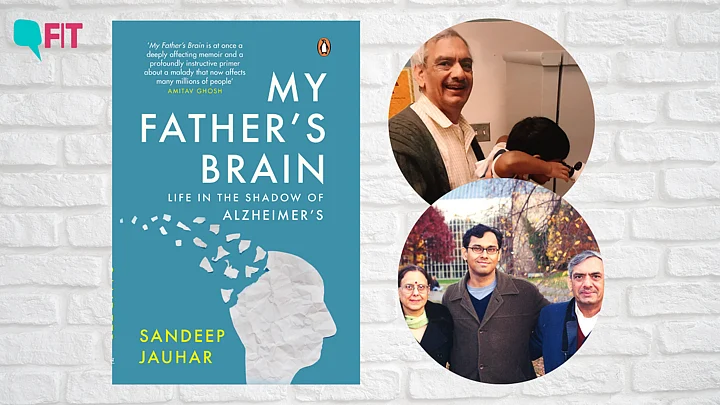“The diagnosis changed my father’s life in many different ways. He was a very successful plant geneticist, running a genetics lab, and publishing scientific papers. After he developed Alzheimer's, his cognition changed, his ability to remember simple things changed, his personality changed.”
When Dr Sandeep Jauhar’s father, Dr Prem Jauhar, was first diagnosed with Alzheimer’s, he didn’t know how to deal with it. Even as a cardiologist who had a fair understanding of dementia, he had a tough time coming to terms for it.
In his new book, My Father’s Brain, Jauhar talks about his father’s struggle with Alzheimer’s, memory loss, and life itself.
FIT spoke to Jauhar about the book and the ethical dilemma of lying to someone with memory loss.
The Ethical & Moral Dilemma of Lying
Dr Prem Jauhar, who got diagnosed with Alzheimer's when he was 74, would forget everyday things quite frequently after his diagnosis. But his son’s general disposition was always to tell him the truth.
“I wanted to level with him. I wanted to remind him that he was making mistakes because I thought that orienting him to reality, my reality, would maybe help him. Telling him the truth meant that he was still a part of this world, who still deserved to be treated as a human being and with dignity.”Sandeep Jauhar
Jauhar didn’t want to lose his father’s faith in case the latter someday realised that they’d all been lying to him. As a doctor too, he had been taught to not be paternalistic or withhold any information from a patient.
These would not be huge, earth-shattering lies anyway. Just small lies that his siblings would tell their father to not confuse him further. “Yes, I called you before I boarded my flight.”
But there were some bigger lies involved too, like when he repeatedly asked about his deceased wife. “Mom is on the plane, she’s coming,” Jauhar’s brother would tell their father.
These lies would put him at peace, let him relax, and comfort him.
A turning point, though, made Jauhar realise that Alzheimer's is such an "overwhelming hurricane of a disease" that it's hard to fight. Jauhar’s father kicked out his caregiver and physically abused her – something he never would have done had he been in complete control of his senses.
After that, Jauhar succumbed to lying too, because it dawned on him that the greater dignity was in not making his father suffer, not causing him anguish with truths he wasn’t okay hearing.
Un 'Sociable' After the Diagnosis
Jauhar’s father came from the thinking that as one grows older, memory is expected to fail them. So when he forgot small and big things, he would not be embarrassed and the impact of it on him would be transient.
On most days, he’d even forget that he had forgotten something. However, his memory was failing at several strands. Dementia had taken away from him the recognisation of the fact that he had dementia.
“Alzheimer's typically starts in the hippocampus, which is responsible for memory. Right next to the hippocampus is a structure called the amygdala, which processes emotions. So typically, memory goes first, then patients develop emotional outbursts, and then as the disease progresses to the frontal and parietal lobes, patients tend to lose self awareness.”
What Jauhar laments is that Alzheimer’s took away from his father the very self-awareness that he needed to function everyday, to ask for help, to socialise with people.
“My father became very marginalised by society and then also, unfortunately, by his own family. We were obviously more patient and more willing to engage with him than the outside world but we also used to get very frustrated. It’s very hard to be a sociable person when you don’t have memory.”
When Jauhar’s father forgot how he knew someone, the shared history, and stories he had with someone else, he also lost any social pillars or friendships he could lean on.
Years of memories and relationships erased from his mind, dementia almost erased his understanding of his life too.
Caregiving, A Huge Challenge
Taking on the role of a caregiver though was extremely challenging and trying, recalls Jauhar.
“Even though I'm a doctor, I really didn't know too much about dementia. I was really unprepared and I think a big part of that was because I didn't really understand the neurological script that Alzheimer's follows.”
Jauhar says that even as he was confused and frustrated with everything that was happening, he had to learn to be patient with his father.
It took him some time to realise that Alzheimer’s preferentially affects short term memory, which meant that his father could remember things from the Partition, from when they moved to the US in 1977, and his own childhood but not what he had for lunch.
“I became very frustrated because he would ask me to remind him of things, or he would tell the same story over and over again.”
“At some point in the illness, we called a psychiatrist, and my brother, who is also a cardiologist, said, ‘Dr Gupta, I just deal with blockages in the arteries. This is so much harder to manage, so much harder.’ And he was absolutely right. As a clinician, as a caregiver, as a patient, it’s one of the most difficult journeys.”Sandeep Jauhar
Jauhar says he has written in his book what he had needed when his father got diagnosed – the history and science of dementia, what happens in the brain when Alzheimer’s strikes. His father battled with Alzheimer's for seven years, but he hopes his book will make the journey easier for others – patients and caregivers alike.
(My Father’s Brain: Life in the Shadow of Alzheimer’s, published by Penguin Random House India, will be released on 29 May.)

